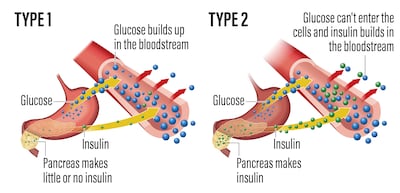Some people using the weight-loss treatments Ozempic, Wegovy and Mounjaro say food tastes sweeter or saltier after they took the slimming injections or pills, a study found.
About one in five said their food tasted sweeter, while the same proportion thought it was saltier, according to research presented at the Annual Meeting of the European Association for the Study of Diabetes in Vienna. The change in how taste was perceived helped to reduce their appetite, the real-world study showed.
The therapies increase the levels of incretins – hormones – which are produced naturally when you eat and reduce blood glucose levels. By mimicking the action of a hormone called GLP-1, they reduce appetite and feelings of hunger, slow the release of food from the stomach and increase feelings of fullness after eating.
“Incretin-based therapies such as Ozempic, Wegovy and Mounjaro are widely used for weight management but their effect on taste perception has been unclear,” says Prof Othmar Moser, of the University of Bayreuth in Germany, who led the research published in the journal Diabetes, Obesity and Metabolism. “If changes in taste are linked to greater appetite control and weight loss, this could help clinicians better select therapies, provide more tailored dietary advice and improve long-term treatment outcomes for patients.”
Hundreds of overweight people taking Ozempic, Wegovy or Mounjaro for weight loss for more than three months were surveyed about their sense of taste and appetite. They were asked whether their sense of taste – sweetness, saltiness, sourness and bitterness – had changed since starting treatment, as well as whether they experienced any changes in appetite and food cravings.
About a fifth (21.3 per cent) said food tasted sweeter, while 22.6 per cent found it was saltier than before. Their perception of bitterness and sourness did not change. More than half of participants (58.4 per cent) reported they were less hungry in general and their food cravings were reduced.
Those whose food tasted sweeter or saltier were twice as likely to say they felt full, compared with participants whose sense of taste did not change.
“These drugs act not only in the gut and brain areas that control hunger, but also on taste bud cells and brain regions that process taste and reward,” Prof Moser said. “This means they can subtly change how strong flavours, like sweetness or saltiness, are perceived. This, in turn, may affect appetite.”
But the study did not find any link between changes in taste perception and a reduction in BMI. The researchers suggested that is because sense of taste is only one of many factors involved in weight loss.
“Shifts in taste may affect how satisfying or appealing food feels in the moment, which influences appetite control,” Prof Moser said. “However, weight loss depends on many other factors – like metabolism, long-term eating patterns and activity – so changes to taste alone may not be enough to directly drive body weight reduction.”
 Food noise
Food noise
A separate study presented at the conference showed people taking semaglutide – the generic name for several of weight-loss medications – experience less “food noise” than before. The term refers to obsessive and intrusive thoughts about food and eating.
Previous research found that 57 per cent of people who are overweight or obese have experienced food noise, although few are familiar with the term.
In the latest study, carried out by researchers from pharmaceutical company Novo Nordisk and market research company Market Track, the proportion of participants experiencing constant thoughts about food dropped from 62 per cent before starting treatment to 16 per cent. The proportion who said they spent too much time thinking about food fell by a similar amount, from 63 per cent to 15 per cent.
‘The Woman in the House Across the Street from the Girl in the Window’
Director:Michael Lehmann
Stars:Kristen Bell
Rating: 1/5

